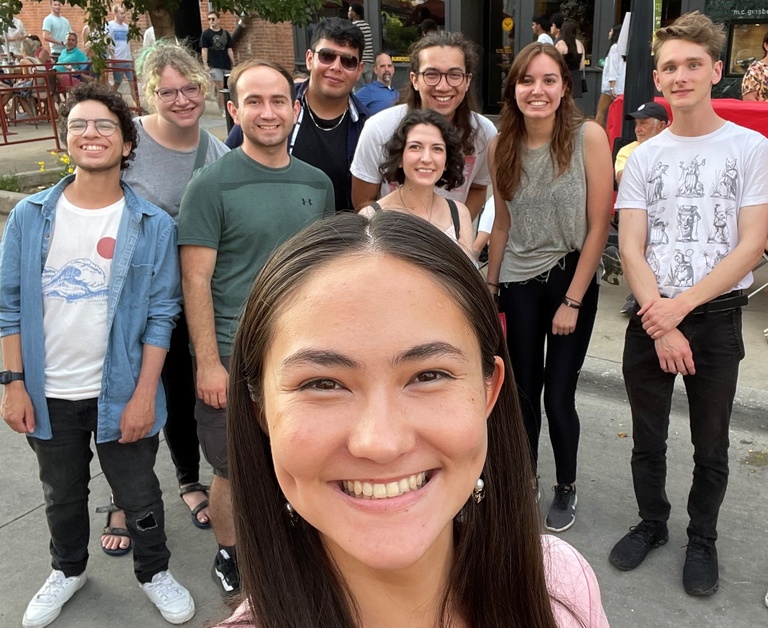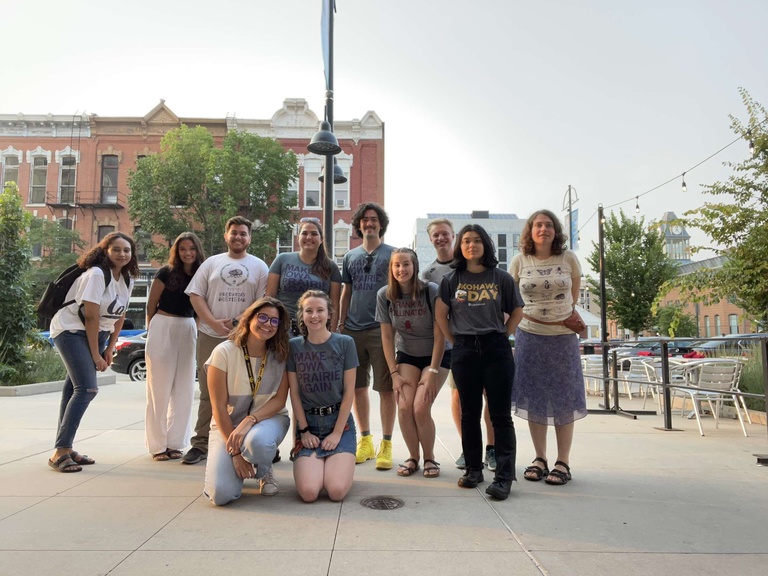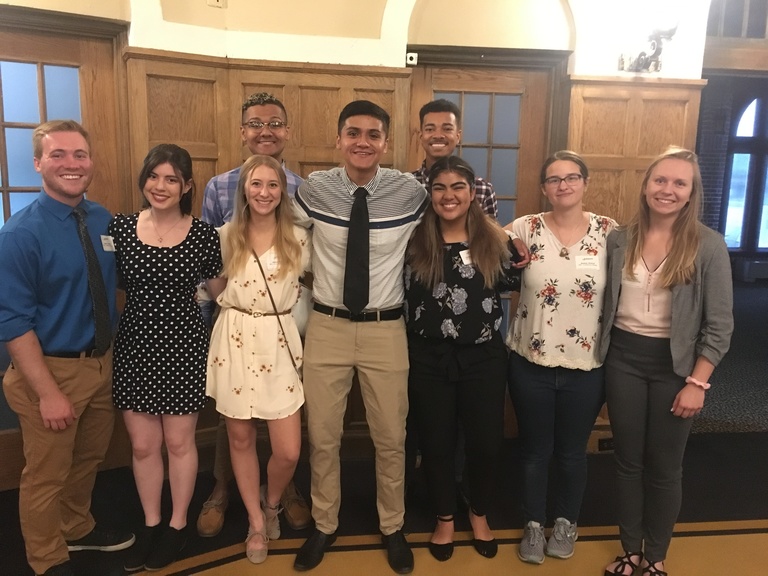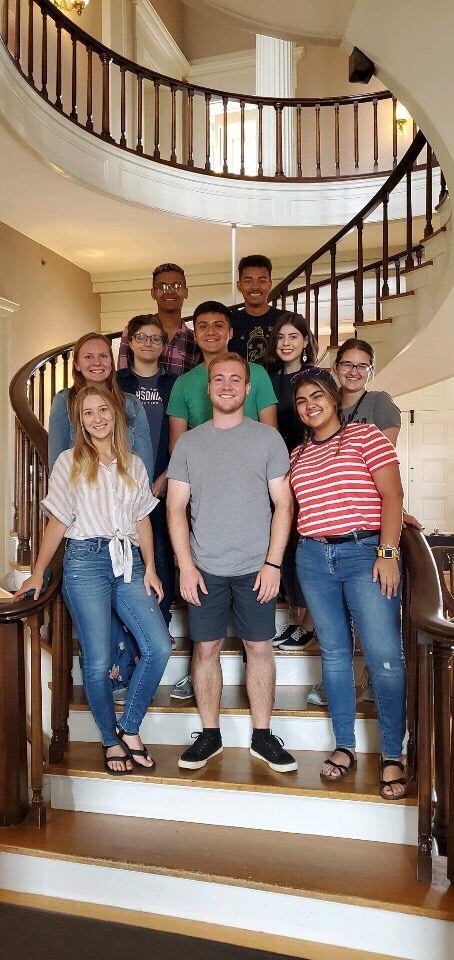Main navigation
Interdisciplinary evolutionary sciences research experiences
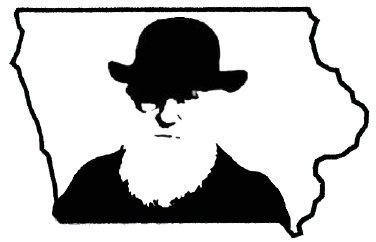
The focus of this REU is training in evolutionary science, with students working on research projects across several disciplines. Several academic departments at the University of Iowa offer research projects that span a range of topics, including evolution of behavior, origin of species, cancer evolution, evolution of sex, paleontology, and the evolution of disease. Study organisms span a large range of taxa, and include: flies, snails, fungi, viruses, wasps, human cancer cells, beetles, and disease-causing bacteria and protozoa. Students work on one project, but through interactions with their cohort ultimately receive a broad exposure to evolutionary science. As part of the program, students: receive training in research best practices, participate in career workshops, create a digital exhibit based on their research for the University of Iowa Natural History Museum, and make formal research presentations based on their work. Housing, a meal allowance, stipend ($6,250), and a travel allowance are provided to all participants.
Questions? Contact Dr. John Logsdon (john-logsdon@uiowa.edu)
Mentors and project areas
- Mark Blumberg - Developmental and comparative investigations of sleep
- Josep Comeron - Causes and consequences of genome evolution
- Dan Eberl - Comparative mechanisms in insect hearing
- Albert Erives - Evolution of development in beetle antennae
- Jan Fassler - The evolutionary history and molecular mechanism of long-distance activation in fungi
- Anthony Fischer - Evolution of antibiotic resistance by Staphylococcus aureus in patients with cystic fibrosis
- Andrew Forbes - Diversity, ecology, and evolution of oak gall wasps and their natural enemies
- Bin He - Evolution of stress resistance and response in a group of yeast species that include human pathogens
- Drew Kitchen - Emergence and rate of evolution in viruses
- Ana Llopart - The molecular basis of speciation
- John Logsdon - Molecular evolution of sex and meiosis
- Sarit Smolikove - DNA Damage Repair and Meiosis
- Christopher Stipp - The evolution of tumor heterogeneity
- Mary Wilson - Host and pathogen factors underlying leishmaniasis
Program eligibility
Participants should:
- Be US citizens or permanent residents enrolled at U.S. universities
- Be majoring in a STEM field (especially biology, biological anthropology, or geoscience with a paleontology emphasis)
- Be available to attend the entirety of the program, May 25 through August 2, 2025
- Have a grade-point average (GPA) of 3.0 or above
- Have a background in science coursework. Coursework that connects directly to topics in evolution will be favored.
- Have a strong work ethic and motivation to learn
- Have an interest in pursuing a career in scientific research
- Identify three or more potential research mentors from this list.
Students from underrepresented minority groups and/or who have limited research opportunities at their home institution are especially encouraged to apply.
Questions? Contact Dr. John Logsdon (john-logsdon@uiowa.edu)
REU alumni projects
2025 REU Cohort
2024 REU Cohort
2023 REU Cohort
2022 REU Cohort
2021 REU Cohort
2019 REU Cohort
- Carolina Pacheco Diaz, Universidad Ana G. Mendez
- "Functional Conservation of Med15 in Humans and Fungi"
- Advisor: Jan Fassler
- Rebecca Davenport, Loyola Marymount University
- "The Limitations and Advantages of Citizen-Science Data in Measuring Bee Diversity of Iowa Prairies."
- Advisor: Steve Hendrix
- Charles Davis, Rice University
- "Describing the Natural Enemy Communities Associated with Andricus foliatus galls on two host trees: Quercus geminata and Quercus virginiana."
- Advisor: Andrew Forbes
- Alex Jonguitud, University of South Carolina - Beaufort
- "Evolutionary Rates and the History of Polyomavirus Infections in Humans."
- Advisor: Andrew Kitchen
- Rachel Nelson, University of Iowa
- "Early Season Relationships between Floral Resources and Wild Bees in Urban Environments."
- Advisor: Steve Hendrix
- Amanda O'Grady, University of Tennessee - Chattanooga
- "Morphometric Analysis of the Conodont Genus Elictognathus and its Relationship to the Genus Siphonodella."
- Advisor: Brad Cramer
- Amanda Pope, Humboldt State University
- "Using Sleeping Beauty Transposon-mediated mutagenesis to drive the evolution of fluid shear stress resistance in a pancreatic cancer cell population."
- Advisor: Chris Stipp
- Isiaha Price, Amherst College
- "Bayesian Estimates of Polyomavirus Evolutionary Rates."
- Advisor: Andrew Kitchen
- Andrew Seiler, Thomas More University
- "Is Fragment Size or Fragment Number more Important to Moth Biodiversity in Iowa Prairie Fragments?"
- Advisor: Andrew Forbes
- Ari Szubryt, Southern Illinois University
- "The utility of Geometric Morphometrics for Differentiating between Unionid Mussel Species."
- Advisor: Mary Kosloski
